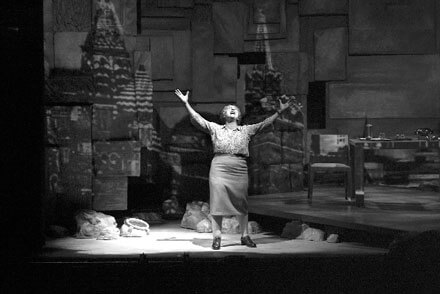One-woman play remembers Golda Meir as a one-dimensional nuclear gambler
The actress Tovah Feldshuh has a facility with character, impersonation, focus, and presence that is remarkable.
And she does it all like a pure diva.
No one, with the possible exception of Patti LuPone, delivers a big dramatic moment like Feldshuh. In fact, she is a scenery chewer of the first order, so it’s a good thing that designer Anna Louizos has given her so much to feast on in “Golda’s Balcony” because if Feldshuh had to rely on what playwright William Gibson has written, she’d starve to death.
This thin play purports to be an explication of the life and heart of Israeli Prime Minister Golda Meir, but what could be powerful drama erodes into something that wouldn’t even pass muster on The History Channel. Somehow, Mr. Gibson has taken one of the most intriguing global political figures of the 20th century and turned her into a total bore—to the point where his dramatic license should be revoked.
A prime example of the “And then I…” school of storytelling that Martin Sherman uses to such monumentally soporific effect in “The Boy from Oz,” Mr. Gibson’s 90-minute monologue plods ponderously along from event to event, enlivened only by strobe lights, explosions, and occasional flashes of theatricality from Feldshuh, each of which, however, has the unintended result of startling half the audience out of a cozy nap.
The story that got away is that of an ambitious and passionate woman who through her own machinations, ambition, and white-hot passion becomes, against all personal and cultural odds, a political force in the world. Meir was a world-class political player, whose defense of Israel virtually saved it, and her influence still resonates through the U.S.-Israeli alliance.
The central event of the play, once we get through her tedious progression from housewife to head of state, is the contemplation Meir gave during the 1973 Yom Kippur War to using nuclear weapons against Israel’s Arab enemies. She successfully bartered her willingness to push the button to persuade the U.S., which opted out of the fighting, to send fighter planes for Israeli use, thus averting a nuclear crisis.
Meir played a daring game of near blackmail that represented the closest point that the Mideast has come to thermonuclear obliteration, a fact not lost on Richard Nixon and his secretary of state Henry Kissinger. This political showdown should be the climax of “Golda’s Balcony,” but instead it comes off as just one more thing a hard working prime minister has to face. Everything leading up to her choice not to unleash a holocaust of her own—her childhood, her marriage, World War II, the formation of Israel, and her role in populating a new nation—should culminate in this moment.
But Gibson has squandered his opportunities. Where passion might collide with political maneuvering and personal foibles entwine themselves in political struggles, we instead have a laundry list of biographical highlights in a staged documentary. The play should be as galvanizing as Meir’s personality, but instead one is left bored and angry. Meir made many world leaders angry, but boring was never part of her repertoire.
Feldshuh, nonetheless, acquits herself well. With a prosthetic nose and enlarged legs, she looks the part. Director Scott Schwartz has eked some drama from the script and Ms. Feldshuh does admirably with it. But, one never feels that Feldshuh takes us into the soul of Meir. Instead, one is left marveling at a technically proficient performance that has predictable highs and lows. Feldshuh is a wonderful mimic, and in portraying Meir’s conversations with world leaders, she captures the precise cadence of each voice. Her Meir voice picks up the flat Midwestern inflection with which the Milwaukee-born prime minister spoke English.
But this is all gilding the artificial lily. Throughout the play, serious moments are punctuated by explosions, to the point where one starts thinking of the horse in “Young Frankenstein,” as undesirable as that might be. During a moment when the American planes arrive, Feldshuh stands downstage as projections of fighter planes zoom past her. I can’t be the only one who was reminded of Natalie Wood starting the drag race in “Rebel Without a Cause.” These devices feel like an attempt to cover the shortcomings of the script, but they have the opposite effect. They trivialize both Meir and history. It’s a all a little too much like Baby June’s show biz bromide in “Gypsy”: “No matter how bad the act, wave a flag at the end and people will love you.”
For all its ponderous air of self-importance, “Golda’s Balcony” is a forgettable and regrettable play. It feels superficial, and that’s something that Meir never was.
































